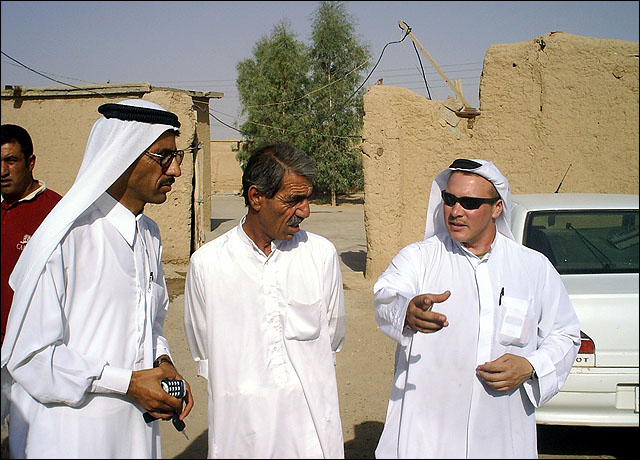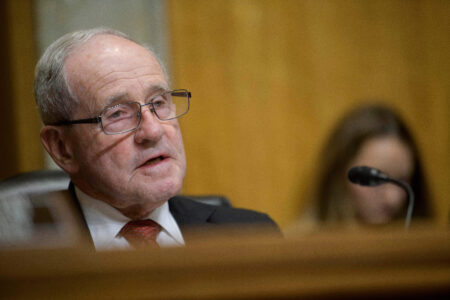U.S. soldier named honorary sheik in recognition of efforts to help Iraqis
Qayyrah, Iraq ? Sheik Horn floats around the room in white robe and headdress, exchanging pleasantries with dozens of village leaders.
But he’s the only sheik with blonde streaks in his mustache – and the only one who attended country music star Toby Keith’s recent concert in Baghdad with fellow U.S. soldiers.
Officially, he’s Army Staff Sgt. Dale L. Horn, but to residents of the 37 villages and towns that he patrols he’s known as the American sheik.
Sheiks, or village elders, are known as the real power in rural Iraq. And the 5-foot-6-inch Floridian’s ascension to the esteemed position came through dry humor and the military’s need to clamp down on rocket attacks.
Late last year a full-blown battle between insurgents and U.S. and Iraqi forces had erupted, and U.S. commanders assigned a unit to stop rocket and mortar attacks that regularly hit their base. Horn, who had been trained to operate radars for a field artillery unit, was now thrust into a job that largely hinged on coaxing locals into divulging information about insurgents.

U.S. Army Staff Sgt. Dale L. Horn, right, of Fort Walton Beach, Fla., speaks with Dr. Mohammed Ismail Ahmed, a local sheik, left, and a villager in Ojba, Iraq. Horn was made an honorary sheik for his efforts to help villages in his patrol's area.
Horn, 25, a native of Fort Walton Beach, Fla., acknowledges he had little interest in the region before coming here. But a local sheik friendly to U.S. forces, Dr. Mohammed Ismail Ahmed, explained the inner workings of rural Iraqi society on one of Horn’s first Humvee patrols.
Horn says he was intrigued, and started making a point of stopping by all the villages, all but one dominated by Sunni Arabs, to talk to people about their life and security problems.
Moreover, he pressed for development projects in the area: he now boasts that he helped funnel $136,000 worth of aid into the area. Part of that paid for delivery of clean water to 30 villages during the broiling summer months.
“They saw that we were interested in them, instead of just taking care of the bases,” Horn said.
Mohammed, Horn’s mentor and known for his dry sense of humor, eventually suggested during a meeting of village leaders that Horn be named a sheik. The sheiks approved by voice vote, Horn said.
U.S. toll
As of Sunday, July 31, 2005, at least 1,794 members of the U.S. military have died since the beginning of the Iraq war in March 2003, according to an Associated Press count. At least 1,382 died as a result of hostile action. The figures include five military civilians.
Some sheiks later gave him five sheep and a postage stamp of land, fulfilling some of the requirements for sheikdom. Others encouraged him to start looking for a second wife, which Horn’s spouse back in Florida immediately vetoed.
But what may have originally started as a joke among crusty village elders has sprouted into something serious enough for 100 to 200 village leaders to meet with Horn each month to discuss security issues.
And Horn doesn’t take his responsibilities lightly. He lately has been prodding the Iraqi Education Ministry to pay local teachers, and he closely follows a water pipeline project that he hopes will ensure the steady flow of clean water to his villages.
“Ninety percent of the people in my area are shepherds or simple townspeople,” said Horn. “They simply want to find a decent job to make enough money to provide food and a stable place for their people to live.”
To Horn’s commanders, his success justifies his unorthodox approach: no rockets have hit their base in the last half year.




